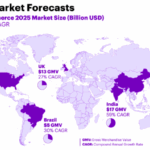In a strategic move aimed at capturing Europe’s growing demand for low-cost online shopping, Amazon is reportedly preparing to launch its budget-friendly storefront, Amazon Haul, across several European countries later this year. The platform, which has seen experimental rollout in select markets, is Amazon’s direct response to the meteoric rise of ultra-cheap e-commerce rivals like Temu, Shein, and AliExpress.
Amazon Haul is designed to feature heavily discounted items sourced from both global and local sellers, with a particular focus on fashion, home goods, beauty products, and electronics. Insiders familiar with the development say the storefront will operate somewhat independently from the main Amazon interface, targeting Gen Z and budget-conscious millennial consumers who have been increasingly drawn to fast-fashion and “TikTok haul” culture.
The move comes amid Amazon’s recent performance review in Europe, where it continues to dominate in logistics and fulfillment but has faced growing pressure from non-EU platforms offering ultra-low prices with minimal tax or regulatory oversight. Amazon’s strategy with Haul appears to blend affordability with its established strengths—prime delivery infrastructure, customer service, and buyer protection—hoping to offer a safer, faster alternative to marketplaces often accused of shipping counterfeit or substandard goods.
European regulators have welcomed the idea cautiously. “If Amazon can match low prices while maintaining consumer protection and tax compliance, it’s a welcome counterweight to the current free-for-all,” one EU trade official said anonymously.
The launch of Haul also follows the EU’s intensified scrutiny of platforms like Shein and Temu, which face investigations over tax loopholes, unsafe products, and unfair trade practices. In this context, Amazon is likely to market Haul as a “regulated alternative”—a selling point it could leverage both with consumers and regulators.
However, challenges remain. Maintaining Amazon’s quality and return standards while competing on price is no small feat. Sellers will need to find new ways to slash costs while staying within the stricter EU framework, including VAT rules and environmental compliance under the Digital Services Act.
No official announcement has been made yet, but market watchers expect a phased rollout beginning in Germany, France, and Spain by Q3 2025, with broader EU coverage to follow by early 2026. If successful, Amazon Haul could reshape the European e-commerce landscape, offering a bridge between regulation and affordability in a space currently dominated by aggressive overseas players.










